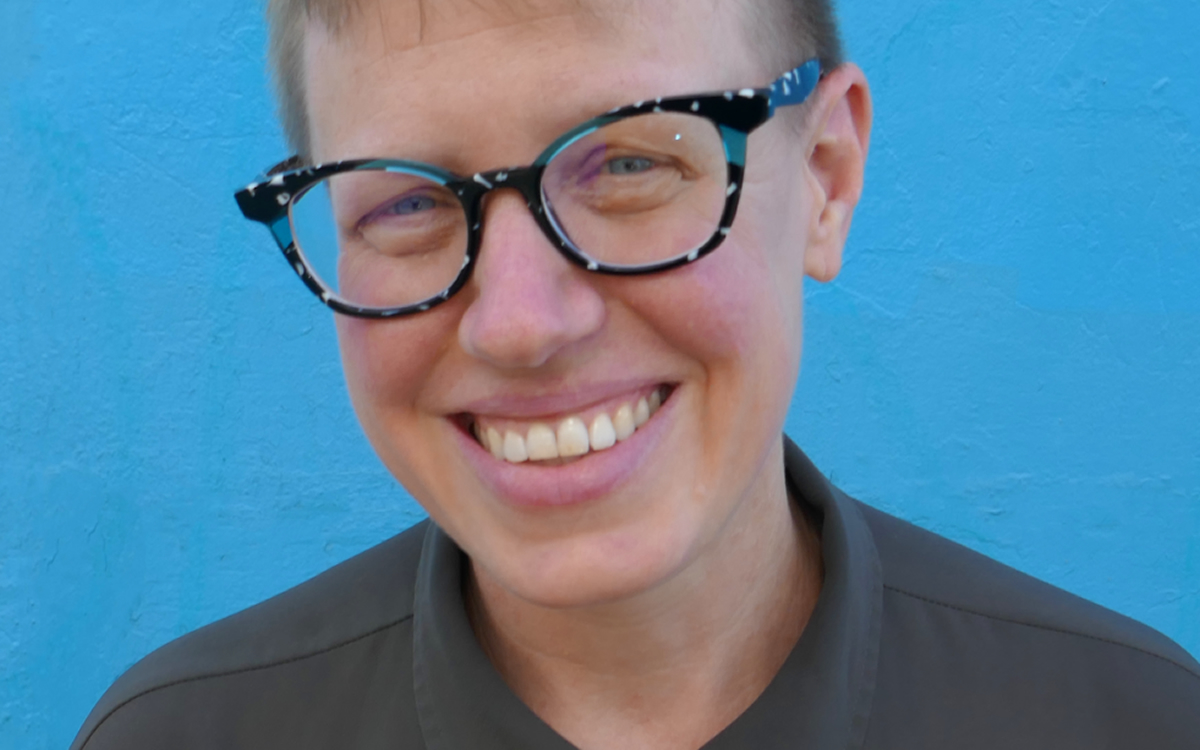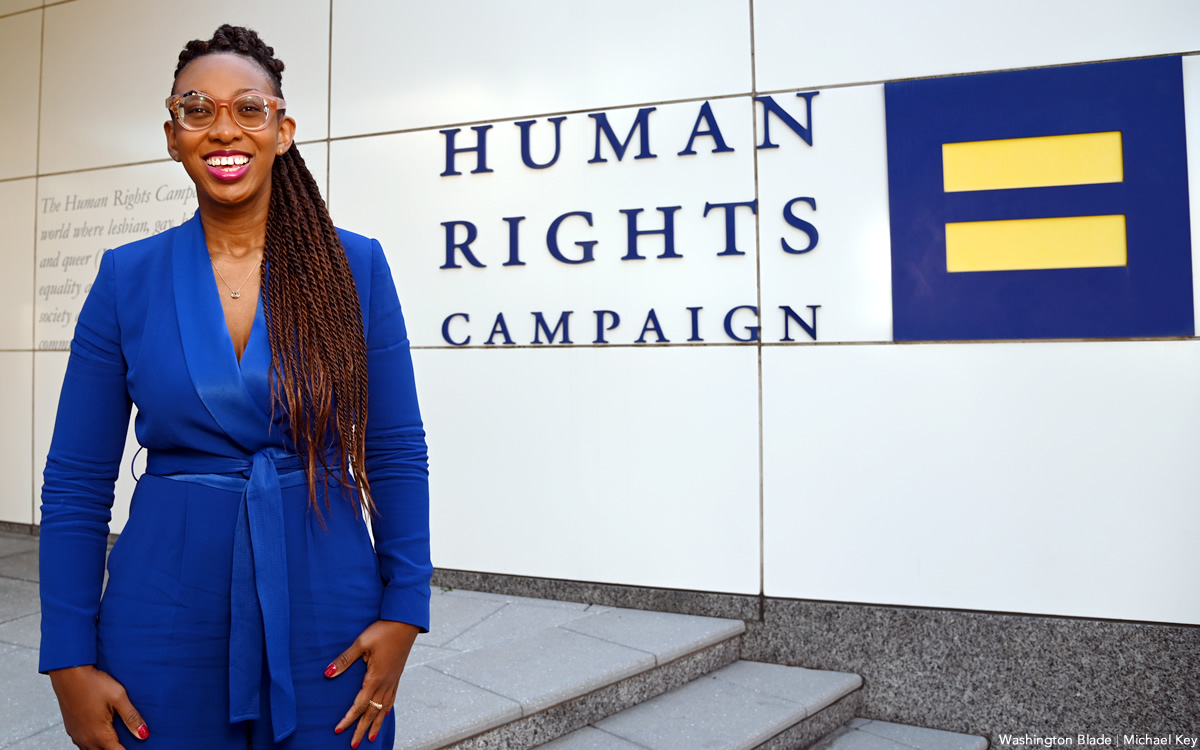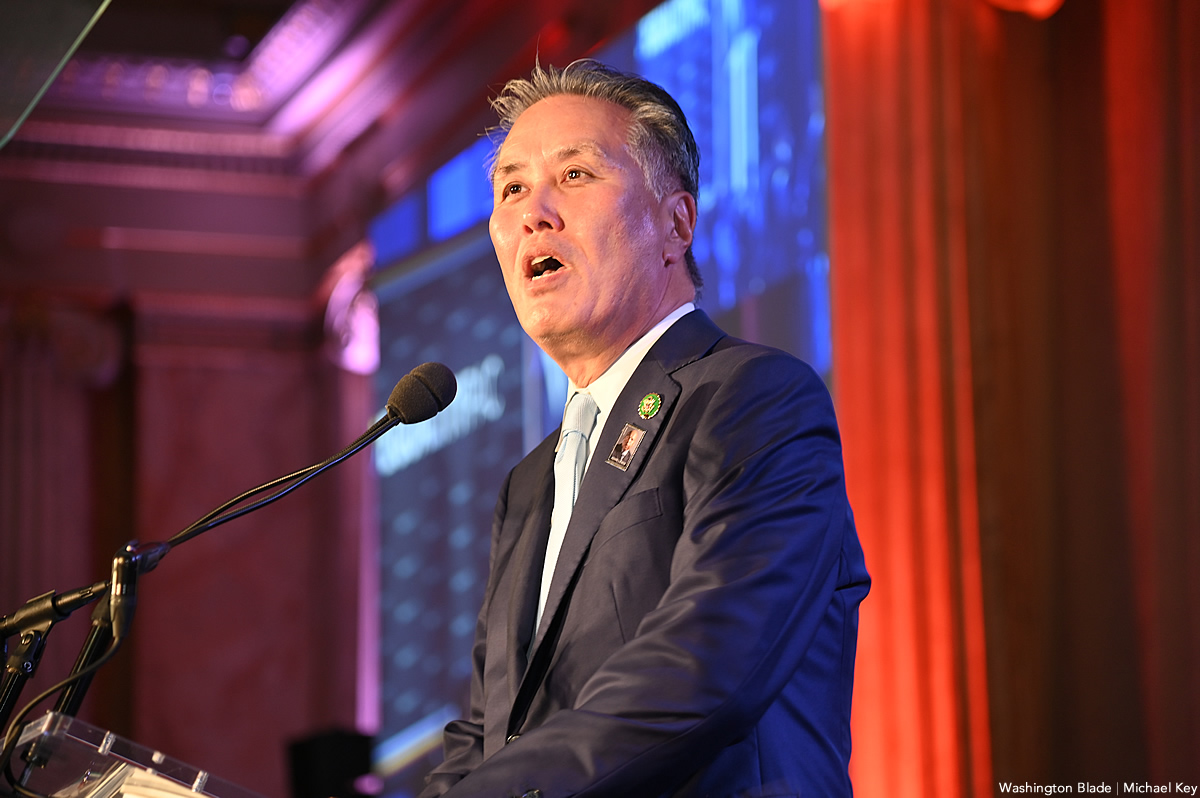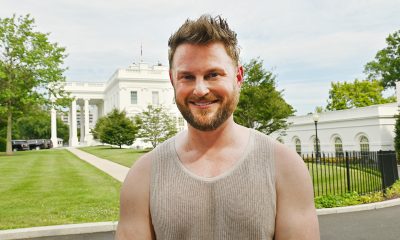Politics
Blade’s Q&A with American Library Association President Emily Drabinski
Conversation comes after a week of battles over book bans on Capitol Hill

American Library Association President Emily Drabinski was in Washington for the PFLAG National “Learning with Love” Convention, whose timing and theme are particularly apposite this year given the escalating fight this week on Capitol Hill over book bans.
She connected with the Washington Blade Saturday morning to discuss matters including how best to combat efforts to pull books from library shelves and ways to help restore public faith in the these institutions along with the qualified professionals serving in them.
Drabinski on Wednesday was named to the Out 100 2023 list, which celebrates the year’s “most impactful and influential LGBTQ+ people” and has included some of the most famous and celebrated public figures.
The honor comes about 16 months after Drabinski was named ALA president and then immediately earned right-wing backlash for a celebratory tweet in which she reflected on the significance of her election as a lesbian with progressive views.
Among the first to speak out against her over the tweet was a co-founder of Moms for Liberty, the anti-LGBTQ group that promotes book bans, opposes public support and funding for libraries and other institutions, and is considered a far-right extremist group by the Southern Poverty Law Center. It was not long before elected Republican officials followed suit.
These critics often argue for their right to hold and express political opinions as they wish while claiming that others are unsuited for high profile roles because they hold or have shared views they find objectionable, those that are left-of-center, said Drabinski, who acknowledged homophobia also played a role in the outrage directed at her.
At the same time, Drabinski stressed that her focus remains on the responsibilities of leading the ALA, many of whose 49,000+ members have also been personally targeted by school boards, elected officials, and advocacy groups like Moms for Liberty.
The ALA is not alone in raising the alarm over the alignment of these parties and interests in favor of censoring certain ideas and voices, a movement which according to PEN America has led to an unprecedented number and range of titles being pulled from library shelves across the country.
“These efforts are a threat to student’s rights and freedoms,” according to a spokesperson for the U.S. Department of Education, whose Office of Civil Rights last month appointed Deputy Assistant Secretary Matt Nosanchuk whose duties include responding to book bans, taking “enforcement action when necessary.”
This interview has been edited for length and clarity.
American Library Association President Emily Drabinski
October 21, 2023 Interview with the Washington Blade’s White House correspondent, Christopher Kane.
Washington Blade: Reading about the backlash you encountered, I was reminded of Gigi Sohn’s confirmation process in the Senate and how ugly that got. I’m curious to hear how your experience with this may have impacted the way that you look at whether and how to share your political views publicly. And more broadly, as the issues that are top of mind and front and center for ALA are becoming really politically fraught, how you look at the intersection of politics with your work?
Emily Drabinski: It’s a question I think about constantly. You know, I think everybody has a political viewpoint, all of us do, and my political views inform how I think about the world and how I explain the world to myself, but the American Library Association isn’t about me. The status of American libraries is not about me. Attacks on the right to read and and libraries in general, they might have my name on them, but they’re clearly not about me.
What’s been frustrating is to see the whole entire Association — which is about what libraries are about, which is building community; it’s about collective action and collectives of people coming together. [So], to see the focus on me as an individual has been really distressing.
It’s also not lost on me which ideas you can have, which identities you can have, or which you can write — like what political viewpoint will get you this kind of blowback. And it’s not everybody, right? It’s only some of us. You know, they’re all about freedom of thought and they’re all against cancellation of individuals for their viewpoints, and yet they don’t extend that to people from across the political spectrum.
Blade: You mentioned the issue of which identities are allowed. The homophobia seems not to be lingering beneath the surface; this is really tinged with homophobia.
Drabinski: Absolutely. When the Montana Library Commission voted to not renew their membership with the American Library Association, that was about my queer identity as much as it was about anything else.
Regardless of what they said, when you listen back to the hearing, there were that someone on the call quoting Leviticus — which felt like, you know, so, so regressive, and a kind of conversation about queer identity that I had, that I remember us having in the 90s. And I thought we were in a different kind of world, but it’s like the book bans — there are obvious attacks on black people, people of color, indigenous people, and LGBTQ+ people. And so it’s no surprise that they’ve come from for me also, I suppose.
Blade: Did you meet with lawmakers when you were in Washington, and can you tell me about what your advocacy work has looked like recently?
Drabinski: I did not meet with lawmakers. I was here to be at PFLAG. ALA continues to work with lawmakers, and I think it’s important to say across the political spectrum, you know, we there’s broad bipartisan support for libraries. That’s always been true. And so we work with people from all sides of the aisle around the right to read. So, you know, I don’t want it to seem like the politicization of libraries is coming from the Republican Party in general. I think we all know it’s from a minority of people that don’t represent the broad political spectrum in this country.
Blade: And those voices have become, I think, amplified on social media. You’ve certainly had experiences with Moms for Liberty. I’m curious to hear your thoughts about the group and its influence and maybe some of the ways that that that might be countered, you know, from the left.
Drabinski: I don’t follow the group very closely, you know, just because I think that their work — they want to sort of sow chaos, I think, inside of public institutions, including schools and libraries. They’re very well funded; their funding is difficult to track. They clearly aren’t local, right? You have in many libraries Moms for Liberty groups trying to ban books when they’re not even members of the community.
But I think what we can learn from them is what it means to be loud, right? They have a tiny number of people who are very, very loud and draw a lot of attention and in some cases can drown out the other side at various school and library board meetings. But what I’m seeing on the ground when I travel around the country is that once people understand what is happening in their libraries, they are quick to mobilize against it.
Even in southern Louisiana, right, near the gulf where you had St. Tammany Parish, the story of the attacks on the libraries there which have been definitely driven by these organized groups. [The state’s Attorney General] Jeff Landry [created] a tip line where you can report on your librarians and teachers for distributing, you know, inappropriate materials or whatever. He campaigns on this issue in St. Tammany, but even in St. Tammany, the community is organized to fight back and you see books now making their way back to the shelf.
So, I think that there’s something for us to learn — that we need to be as loud as they are. We know we’ve got numbers on our side. As long as we can get everybody out to the meeting when the decisions are being made, as long as we can get people who are pro-library, pro-reading and pro-freedom, frankly, in positions of authority in local government and on library boards, I think we’re gonna win because poll after poll shows that that nobody’s against children reading. You just can’t be.
Blade: I’m reminded now of your comments during last night’s panel discussion at the PFLAG conference about the importance of these library board elections. Do you think that there’s more work to be done to build out an infrastructure of grassroots organizing around these issues in the same way that Moms for Liberty has done?
Drabinski: Yeah, I think so. I think that’s the way to win, right, is to have densely organized people on the ground who have a vision of a world that’s about equality and equal access to public resources. We have the desire to have people live on our side. Most people want those things. But the one thing I would push back against is the idea that we don’t have organized entities doing that kind of work already. I think we’ve paid less attention to those movements than we should.
So, for example, in St Tammany Queer North Shore is a social group that has been organized around all the things that LGBTQ+ people do, hanging out with each other, going to potlucks, go to parties, or making a float for the Mardi Gras parade — but then they also see what’s happening in their local library and they organize quickly and got a lot of the community out to support the library.
There’s a recent story in Convergence Magazine that talks about a library in Danvers, Massachusetts where they had people organized to protest a drag queen makeup hour, where they were gonna teach you how to put on makeup, which is such a great program, right? And 350 people showed up from the organized labor community, the faith community, the other related movements like the environmental movement, in that area. They showed up en masse to protect the library and formed a human chain, a human wall around a library to keep the 11 protesters away.
So I think sometimes the stories we tell overemphasize the power that groups like Moms for Liberty have, when we have lots of examples that I think get a little less airtime, where you see organized people who care about libraries showing up and and winning.
Blade: There’s also this persistent problem of declining faith in expertise and institutional knowledge. How do you think the media could do a better job of relaying information about these topics?
Drabinski: Every time I see a profile of — you know that profile in the Post of like the 11 people who are behind the vast majority of book ban attempts? I want every one of those profiles to be matched by a profile of a school or public or academic librarian who is doing critical, community based, community focused work to make life better for people.
We’re very activated around the book banners, but we don’t pay enough attention to the parts and places where we’re winning. And so I think a better understanding of what librarians do every day, and what library workers contribute to their community…I see all of this attention being paid to us around the books and stuff. And I want to use this moment to tell the stories of American libraries that are bigger and better and greater than that.
When I go around to libraries and talk to library workers, and they show what they’re doing — everything from a library in Ames, Iowa, [where] you can borrow a pair of reading glasses in the library in case you forgot yours. Like, a little example of the library solving a problem for people and every every library will have like in that same library. And in that library in Ames, there were like 15 other things that were evidence that librarians were solving problems for the community. So I think it’s really important to tell those kinds of stories and they’re a little less sexy, I think, than the meanness, but I think they’re also really important.
That expertise piece, you know, I heard this like stat many years ago about Flickr, the old photo site, the most popular tag on on Flickr was “me,” the word “me,” because people wanted to be able to click on the word and find pictures of themselves. People, right? We curate worlds for ourselves, which is [not shameful]; we all do it.
But what library workers do is they think about everybody at once. They think about the public and think about meeting the needs of the public. So even the “parent’s rights” thing, like I’m a parent. I have rights. I have a child that I want to protect and the idea that by giving my child access to a diverse range of reading materials, which is absolutely a priority in my household, that that would somehow be an attack on someone else’s children. It’s like my librarians know and understand and appreciate publics in a way that nobody else does.
If we could talk more about that public and the service that libraries provide, it would be good for all of us to be thinking about other people rather than so much about our individual solitary worldviews.
I find that when I tell stories about what’s happening in public libraries to people, they’re blown away. Like, there’s a library where you can check out a cotton candy machine in Donnelly Idaho — rural Donnelly, Idaho, a town of like, I don’t know, 4000 people, the vast majority of whom are living below the poverty line.
The library is a public entity that makes it possible for everybody to have a birthday party. And, once a month, they get queer kids together for like after=hours hangout time and they’ve got three or four kids who show up and it’s the only place in the community where they can use the names that they have for themselves and the pronouns that they use for themselves without fear of reprisal. And that’s the work of the library, making that possible.
I think if we could tell more of those stories, of what libraries really do — which is absolutely not distribute pornography — that is not what any library is doing, I absolutely promise you that. It’s not happening.
Blade: For me, the question of who ought to decide things like which materials should be made available to young people and of which ages is settled just with the knowledge that librarians are required to have master’s degrees. But there are many people who refuse to defer to the expertise of medical doctors. Is the kind of storytelling you were describing a way to get around this problem?
Drabinski: Yeah, but you erode trust in public institutions, and you defund them over 40 years of organized disinvestment in the public sector, and then you find that they are weakened. And then you say, this institution is weak and failing, and then you attack it. And we’ve seen this again and again, libraries aren’t the first and we won’t be the last. I think we have a lot to learn from public education, because they came for the teachers at schools first, and now they’ve come for us.
Blade: Absolutely, and in the arts more broadly. I’m thinking of Jesse Helms’s crusade against the National Endowment for the Arts in the 80s.
Drabinski: Totally. we’ve been here before, you know, but I think for a lot of us — I was talking to a couple of other PFLAG-ers this morning, and we can’t believe we’re here again.
Blade: The word “unprecedented” is cropping up a lot lately…
Drabinski: Who doesn’t love a library? Everybody loves the library, right? This attack on a much beloved public institution and the people who steward that institution, that feels unprecedented to me. I had no idea that the world would turn against us in this way; it’s been challenging.
Politics
HRC slams White House over position opposing gender affirming surgeries for minors
‘Biden administration is flat wrong on this’

Human Rights Campaign President Kelley Robinson issued a strong rebuke on Tuesday of the Biden-Harris administration’s position opposing gender affirming surgeries for minors.
The New York Times reported on June 28 that the White House, which broadly supports making medical interventions available for transgender youth, had expressed opposition to surgeries for patients under 18, having previously declined to take a specific position on the question.
“Health care decisions for young people belong between a patient, their family, and their health care provider. Trans youth are no exception,” Robinson responded.
“The Biden administration is flat wrong on this. It’s wrong on the science and wrong on the substance. It’s also inconsistent with other steps the administration has taken to support transgender youth. The Biden administration, and every elected official, need to leave these decisions to families, doctors and patients—where they belong,” she added. “Although transgender young people make up an extremely small percentage of youth in this country, the care they receive is based on decades of clinical research and is backed by every major medical association in the U.S. representing over 1.3 million doctors.”
Robinson said the “administration has committed to fight any ban on healthcare for transgender youth and must continue this without hesitation—the entire community is watching.”
“No parent should ever be put in the position where they and their doctor agree on one course of action, supported by the overwhelming majority of medical experts, but the government forbids it,” she added.
HRC is a prominent backer of Biden’s 2024 reelection campaign, having pledged $15 million to support efforts in six battleground states. The organization has a strong relationship with the White House, with the president and first lady headlining last year’s National Dinner.
A White House spokesperson declined to respond to Robinson’s statement.
Campaign for Southern Equality President Allison Scott also issued a statement.
“This is a cowardly statement from an administration that promised to support transgender people. It is a troubling concession to the right-wing assault on transgender Americans, falling for their false narratives about surgical care and betraying a commitment to equality and trust in the medical community,” said Scott.
“Let’s be very, very clear: Government has no business inserting itself into private medical decisions that should be exclusively between patients, their providers, and the patients’ parent or guardian,” Scott added.
“It is dangerous to begin endorsing categorical bans or limits on healthcare, and there is no justification for restricting transgender youth’s access to the very same care that many cisgender youth receive every year — that’s literally the definition of discrimination,” Scott concluded. “We demand the Biden administration retract this thoughtless statement and work to undo its damage.”
Congress
Members of Congress introduce resolution to condemn Uganda’s Anti-Homosexuality Act
U.S. Reps. Mark Takano (D-Calif.) and Joyce Beatty spearheaded condemnation

More than 20 members of Congress on Thursday introduced a resolution that condemns Uganda’s Anti-Homosexuality Act.
Gay California Congressman Mark Takano and U.S. Rep. Joyce Beatty (D-Ohio) spearheaded the resolution that U.S. Reps. Becca Balint (D-Vt.), Lloyd Doggett (D-Texas), Adriano Espaillat (D-N.Y.), Robert Garcia (D-Calif.), Sylvia Garcia (D-Texas), Josh Gottheimer (D-N.J.), Raúl Grijalva (D-Ariz.), Pramila Jayapal (D-Wash.), Hank Johnson (D-Ga.), Gwen Moore (D-Wis.), Seth Moulton (D-Mass.), Jerry Nadler (D-N.Y.), Eleanor Holmes Norton (D-D.C.), Mark Pocan (D-Wash.), Delia Ramirez (D-Ill), Linda Sánchez (D-Calif.), Jan Schakowsky (D-Ill.), Brad Sherman (D-Calif.), Rashida Tlaib (D-Mich.), Ritchie Torres (D-N.Y.), and Debbie Wasserman Schultz (D-Fla.) co-sponsored.
“The House of Representatives condemns the government of Uganda’s criminalization and draconian punishments regarding consensual same-sex sexual conduct and so-called ‘’promotion of homosexuality,’” reads the resolution.
The resolution, among other things, also calls upon the Ugandan government to repeal the law.
“It is difficult to overstate the gross inhumanity of Uganda’s Anti-Homosexuality Act,” said Takano in a press release.
President Yoweri Museveni in May 2023 signed the law, which contains a death penalty provision for “aggravated homosexuality.”
The U.S. subsequently imposed visa restrictions on Ugandan officials and removed the country from a program that allows sub-Saharan African countries to trade duty-free with the U.S. The World Bank Group also announced the suspension of new loans to Uganda.
The Ugandan Constitutional Court in April refused to “nullify the Anti-Homosexuality Act in its totality.” A group of Ugandan LGBTQ activists appealed the ruling.
“Instead of focusing on rooting out corruption or ending extrajudicial killings, the Ugandan Parliament, president, and Constitutional Court have chosen to mark LGBTQ+ Ugandans as less than human,” said Takano. “Congress must not be silent in the face of such systematic, state-sponsored discrimination.”
“To all those LGBTQ+ people and your allies in Uganda — we see you,” added the California Democrat. “We and the Biden administration will not allow this terrible violation of basic dignity to go unchallenged.”
Politics
LGBTQ issues absent from Trump-Biden debate
Advocacy groups hoped candidates would address queer topics

At their televised debate in Atlanta on June 27, President Joe Biden and former President Donald Trump traded barbs on issues from abortion and election integrity to immigration and foreign policy. The 81 and 78-year-old candidates even argued over who is a better golfer.
Absent from the discussion, however, were matters of LGBTQ rights that have animated national politics in this election cycle with the presumptive Republican nominee promising to weaponize the federal government against queer and trans Americans as the president pledges to build on his record of expanding their freedoms and protections.
CNN hosted Thursday’s debate, with the network’s anchors Dana Bash and Jake Tapper moderating. ABC News will run the second debate scheduled for September 10.
The president’s performance was widely criticized as halting and shaky, with White House reporter Peter Baker of The New York Times writing that Democratic Party leaders are calling for him to be replaced at the top of the ticket.
Also setting the tone early into the program was Trump’s repetition of the lie that Democrats are so “radical” on matters of abortion that they “will take the life of a child in the eighth month, the ninth month, and even after birth.”
Biden, meanwhile, laid the blame at his opponent’s feet for appointing three U.S. Supreme Court justices during his term in office who overturned Roe v. Wade’s 51-year-old constitutional protections for abortion.
He also referenced the fallout from that ruling and the extreme restrictions passed by conservative legislators in its wake, arguing that Trump would not veto a federal abortion ban if Republican majorities in Congress were to pass one.
Trump also repeated falsehoods about the 2020 presidential election.
“Will you pledge tonight that once all legal challenges have been exhausted, that you will accept the results of this election,” Bash asked him, “regardless of who wins, and you will say right now that political violence in any form is unacceptable?”
The Republican frontrunner first responded by denying he was responsible for his supporters’ violent ransacking of the U.S. Capitol Building on Jan. 6 2021.
After the CNN anchor pressed him twice to answer the first part of her question, Trump said, “if it’s a fair and legal and good election, absolutely” but “the fraud and everything else was ridiculous.”
“You appealed and appealed to courts all across the country,” Biden responded. “Not one single court in America said any of your claims had any merit, state or local, none. But you continue to provoke this lie about somehow, there’s all this misrepresentation, all this stealing — there is no evidence of that at all.”
The president continued, “And I tell you what, I doubt whether you’ll accept it, because you’re such a whiner.”
Advocacy groups hoped the debate would address LGBTQ issues
Leading up to the debate, advocacy groups urged the candidates to defend their records on and policy proposals concerning LGBTQ rights, with some arguing the discussion would advantage President Joe Biden’s campaign, as reported by The Hill’s Brooke Migdon.
As the community celebrated Pride this month, the Biden-Harris 2024 team made significant investments in paid media and the Out for Biden national organizing effort to court LGBTQ voters, who are expected to comprise a larger share of the electorate than ever before.
“This will be an enormous slight to our community if LGBTQ questions are not asked during this debate,” GLAAD President Sarah Kate Ellis said. “Our community is deeply affected by where these candidates stand.”
“The safety and freedom of LGBTQ people depends on your engagement with the candidates and ability to inform voters about their records and proposals,” she said.
Annise Parker, the outgoing president and CEO of the LGBTQ+ Victory Fund, said “I certainly hope that the moderators bring up the LGBTQ community and LGBTQ issues, because there is a stark contrast between the two candidates.”
“I hope we see a substantive conversation on the records of these two men for the fight for a more equal society,” said Brandon Wolf, national press secretary at the Human Rights Campaign.
“A vast majority of people in this country support an America that treats people with dignity and respect; they support an America that prevents people from experiencing discrimination and harm simply because of who they are,” he said.
“That is where the American people largely are, and I hope we get an opportunity on that stage to see the contrast between these two candidates.”
-

 Canada1 day ago
Canada1 day agoToronto Pride parade cancelled after pro-Palestinian protesters disrupt it
-

 Theater4 days ago
Theater4 days agoStephen Mark Lukas makes sublime turn in ‘Funny Girl’
-

 Baltimore3 days ago
Baltimore3 days agoDespite record crowds, Baltimore Pride’s LGBTQ critics say organizers dropped the ball
-

 Sports4 days ago
Sports4 days agoHaters troll official Olympics Instagram for celebrating gay athlete and boyfriend










